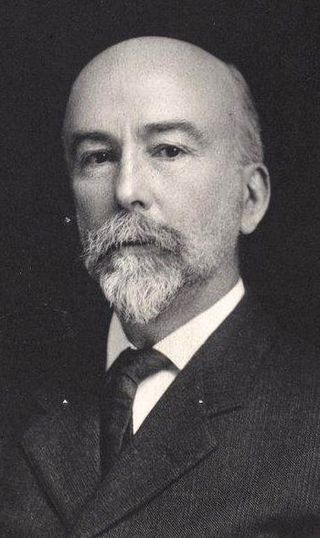
Human geography or anthropogeography is the branch of geography which studies spatial relationships between human communities, cultures, economies, and their interactions with the environment, examples of which include urban sprawl and urban redevelopment. It analyzes spatial interdependencies between social interactions and the environment through qualitative and quantitative methods. This multidisciplinary approach draws from sociology, anthropology, economics, and environmental science, contributing to a comprehensive understanding of the intricate connections that shape lived spaces.

William Morris Davis was an American geographer, geologist, geomorphologist, and meteorologist, often called the "father of American geography".
Walther Penck was a geologist and geomorphologist known for his theories on landscape evolution. Penck is noted for criticizing key elements of the Davisian cycle of erosion, concluding that the process of uplift and denudation occur simultaneously, at gradual and continuous rates. Penck's idea of parallel slope retreat led to revisions of Davis's cycle of erosion.

David W. Harvey is a British-American academic best known for Marxist analyses that focus on urban geography as well as the economy more broadly. He is a Distinguished Professor of anthropology and geography at the Graduate Center of the City University of New York (CUNY). Harvey has authored many books and essays that have been prominent in the development of modern geography as a discipline. He is a proponent of the idea of the right to the city.

Sir Nigel John Thrift is a British academic and geographer. In 2018 he was appointed as Chair of the Committee on Radioactive Waste Management, a committee that gives independent scientific and technical advice on radioactive waste to the UK government and the devolved administrations. He is a visiting professor at the University of Oxford and Tsinghua University and an emeritus professor at the University of Bristol. In 2016 and 2017 he was the executive director of the Schwarzman Scholars, an international leadership program at Tsinghua University in Beijing. He was the Vice-Chancellor of the University of Warwick from 2006 to 2016. He is a leading academic in the fields of human geography and the social sciences.

Torsten Hägerstrand was a Swedish geographer. He is known for his work on migration, cultural diffusion and time geography.

Richard John Chorley was an English geographer, and Professor of Geography at Cambridge University, known as leading figure in quantitative geography in the late 20th century, who played an instrumental role in bringing in the use of systems theory to geography.

The Department of Geography is one of the constituent departments of the University of Cambridge and is located on the Downing Site.
David William Rhind is a British geographer and expert on geographic information systems (GIS). He was Vice-Chancellor of City University, London, until July 2007.
Sir Ronald Urwick Cooke, FRGS DL is a professor of geography and geomorphology who was vice-Chancellor of the University of York from 1993 to 2002.
David Leslie Linton was a British geographer and geomorphologist, was professor of geography at Sheffield and Birmingham, best remembered for his work on the landscape development of south-east England with S. W. Wooldridge, and on the development of tors.

Paul A. Longley is a British geographer. He is Professor of Geographic Information Science (GISci) at University College London (UCL), UK, where he also directs the ESRC Consumer Data Research Centre. Prior to joining UCL in July 2000, he was the Professor of Geography at the University of Bristol.
Michael J Kirkby is a British geographer and Emeritus Professor of Physical Geography at the University of Leeds.

Eric Sheppard is a British and American geographer, and Professor of Economic geography at UCLA.
Haggett is a surname. Notable people with the surname include:
David Ross Stoddart, was a British physical geographer known for the study of coral reefs and atolls. He was also known for key works on the history and philosophy of geography as an academic discipline. He was a lecturer at the University of Cambridge, and then professor and later emeritus professor at the University of California, Berkeley.
Larry Stuart Bourne is a Canadian academic geographer. He has been called a "leading expert on Canadian urban issues." Bourne's academic career has been based in geography/planning at the University of Toronto with interest primarily in North American cities.
Kevin R. Cox is an Anglo-American geographer, who holds the position of Distinguished University Professor, in the Department of Geography, of The Ohio State University
Timothy Peter Burt is a British geographer, academic, and academic administrator. He was Master of Hatfield College, Durham and Professor of Geography at the University of Durham between 1996 and 2017. He had previously taught at Huddersfield Polytechnic, the University of Oxford, and Keble College, Oxford.
Michael Donald Inglis Chisholm was a British economic and human geographer and academic. He was Professor of Geography at the University of Cambridge from 1976 until his retirement in 1996. He wrote several books on the rural economy and human geography, and served for many years as an advisor to the UK government.









